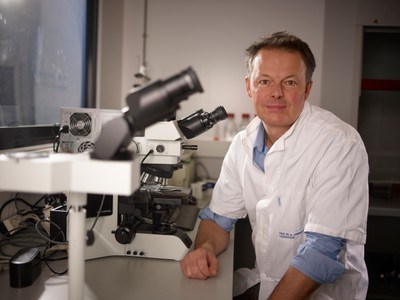A group of researchers from the Flemish Institute of Technology (VIB) and the university of Ghent have discovered a new, previously unknown type of cell at work in the body’s immune system, that could play a crucial role in fighting respiratory infections like the coronavirus Covid-19.
Working with a group of international scientists, the teams of Bart Lambrecht, Martin Guilliams, Hamida Hammad and Charlotte Scott (all from the VIB-UGent Center for Inflammation Research) discovered a new type of cell, which goes about its work in disguise.
The story begins with the body’s reaction to infection, by raising the alarm to the invasion by causing inflammation and fever. These are the signs that the body’s immune system is already at work.
The immune system has various kinds of cells, but the generals in the army, so to speak, are the dendritic cells (DCs), which capture material from the invading cells – bacteria or viruses, known as antigens – and present it to the other immune cells, known as monocytes so they can recognise the invader cells and kill them.
Monocytes, incidentally, are now being used in some cancer treatments, to attack the cancer cells and destroy them in the same way.
The scientists studied mice infected with a viral respiratory tract infection, using technology to obtain an accurate picture of the active genes of the immune system cells, to determine which type of cell each was.
They discovered that what they thought were monocytes are in fact a new type of DC, which they have named ‘inflammatory type 2 conventional DC’ or inf-cDC2 which has properties of a normal monocyte, macrophages (white blood cells that consumer material foreign to the body) and conventional DCs to create a sort of Super DC, disguised as an ordinary monocyte.
“This was a great surprise to us,” said Bart Professor Lambrecht, director of the VIB Inflammation Research Centre. “We all learned that monocyte DCs present themselves as the best antigens during inflammation. Now we are able to show that it is actually a new type of hybrid dendritic cell that does all the work. This changes what we know about the immune system and provides important new insights for viral respiratory infections and other inflammatory diseases.”
Another member of the team, Prof Martin Guilliams, explained, “This was only possible through teamwork. The fingerprinting of individual cells ultimately cracked the complex code of the DC. Many contradictory findings from the past twenty years are now suddenly less mysterious.”
Dr Charlotte Scott, an expert on inflammation at the VIB, said, “In the future it will be interesting to see in which other inflammatory diseases these inf-cDC2s are also formed. We may be able to develop new treatments in the future that harness the power of this new cell to make better vaccines and more potent inflammatory drugs.”
The group’s findings are all the more topical because of their possible application to the current Covid-19 pandemic, which caused by another virus that infects the respiratory system. An emergency treatment currently under consideration is the use of blood plasma from recovered patients, known as convalescent plasma.
According to Cedric Bosteels, the lead author of the new paper, the new Super DCs express a type of protein also found in the plasma of patients recovering from Covid-19. Administering convalescent plasma to patients with the Covid-19 infection would increase their own Super DCs, and offer “a new perspective for the treatment of viral infections and other inflammatory diseases.”
Alan Hope
The Brussels Times

